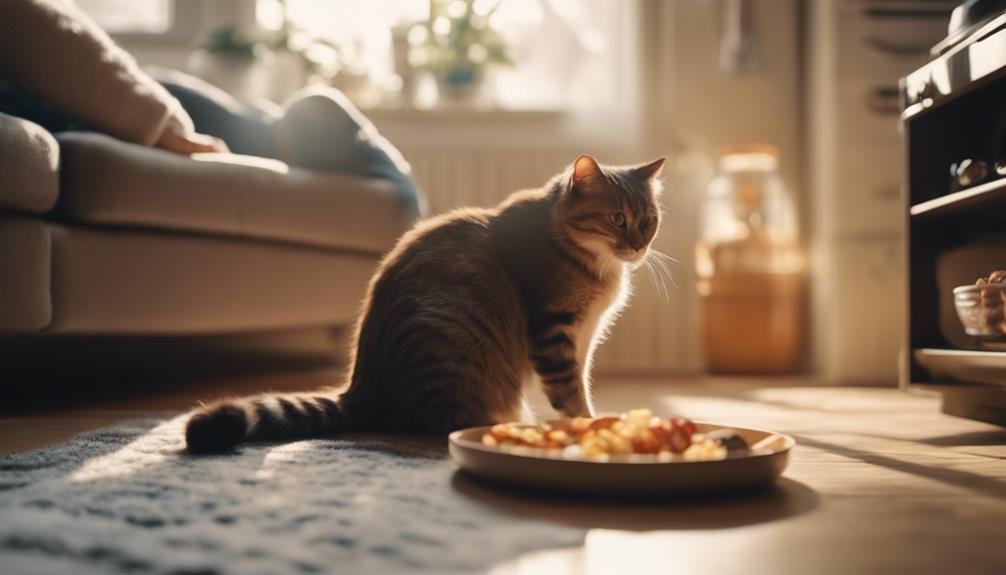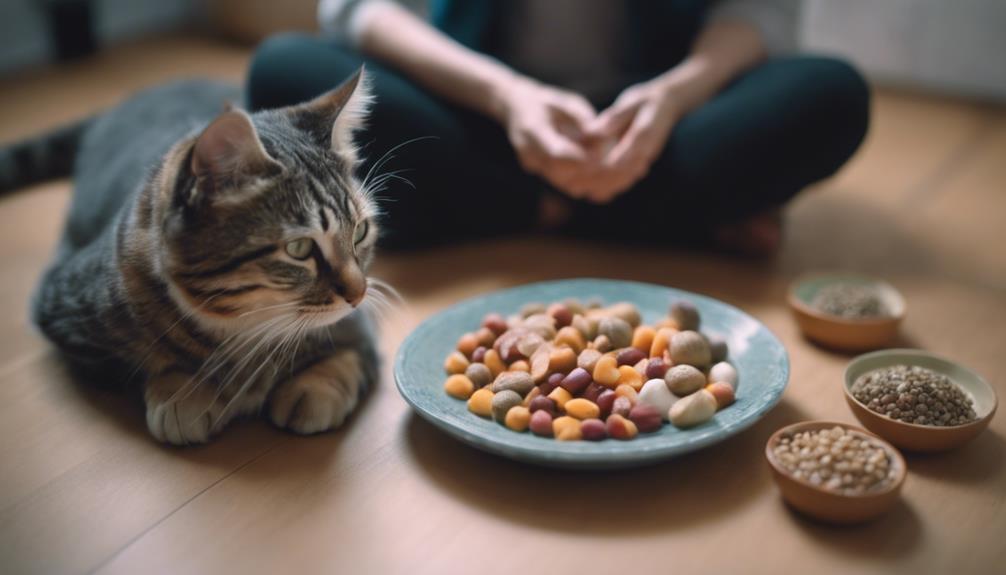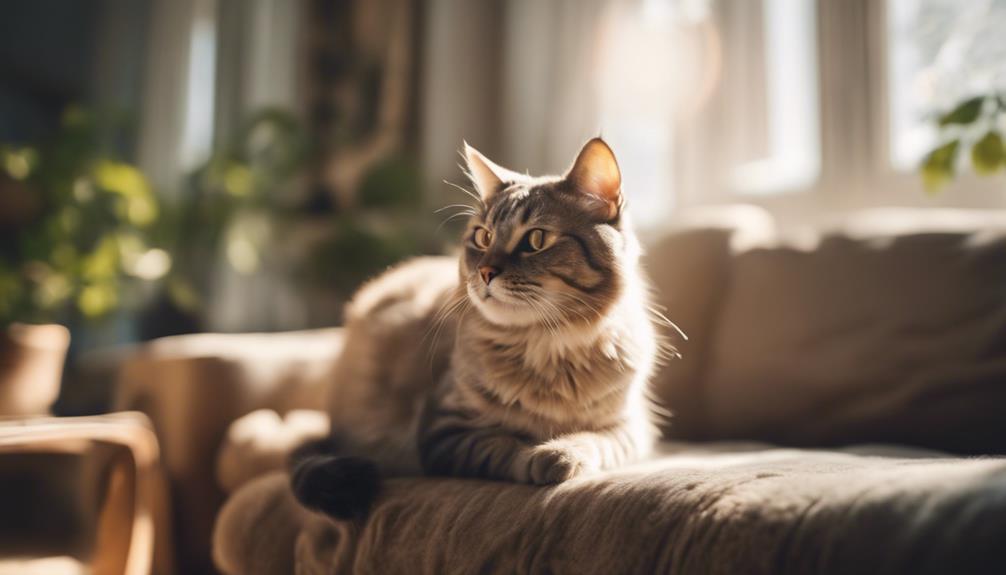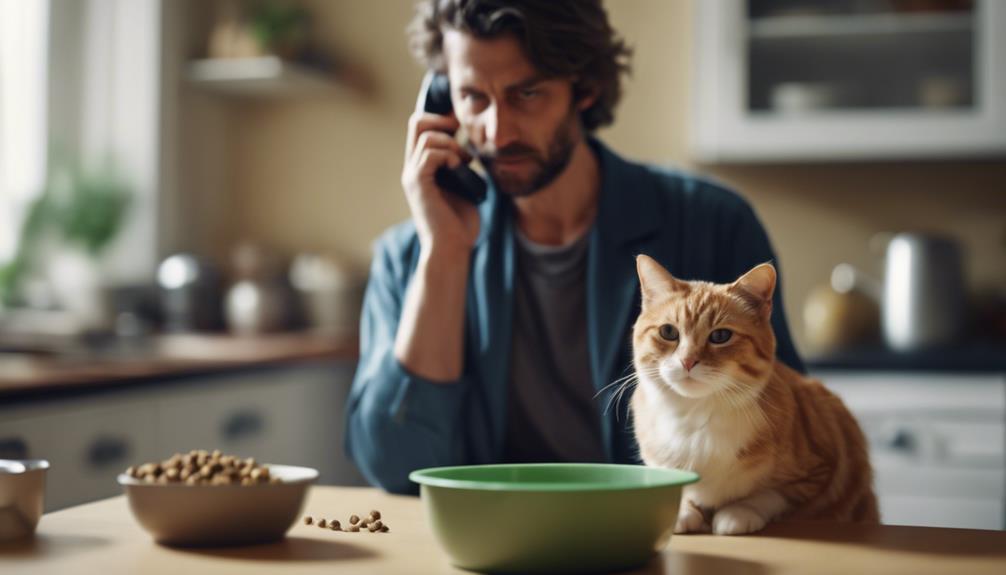In the realm of feline health, instances where a cat exhibits a lack of appetite can be concerning for pet owners. Various factors, ranging from underlying health issues such as infections, dental problems, or emotional disturbances like anxiety, can contribute to a cat's diminished desire to eat.
Additionally, external elements like changes in routine, diet modifications, or the ingestion of foreign objects can also play a role in disrupting a cat's eating habits. Understanding the potential causes behind a cat's decreased appetite is crucial in addressing this issue effectively.
In this article, we will delve into the common reasons why cats may stop eating and explore strategies to help regain their appetite. By identifying the root causes and implementing appropriate solutions, pet owners can support their feline companions in maintaining optimal health and well-being.
Key Takeaways
- Address underlying health issues like infections or dental problems affecting appetite.
- Check for hairballs or foreign objects causing digestive obstructions.
- Minimize disruptions in routines or environments to reduce stress on cats.
- Consider mood changes and food preferences when encouraging your cat to eat.
Identifying Potential Health Issues
Detecting possible health problems is crucial when your cat refuses to eat, as underlying illnesses such as infections, kidney failure, dental issues, or cancer could be the cause of appetite loss.
Monitoring your cat for any signs of illness, such as lethargy, weight loss, vomiting, or changes in litter box habits, can help identify potential health issues early on.
It is essential to consult with a veterinarian promptly to rule out any serious conditions and establish an accurate diagnosis. Diagnostic tests, including blood work, urine analysis, and imaging studies, may be necessary to pinpoint the underlying cause of your cat's decreased appetite.
Early detection and intervention can significantly improve your cat's prognosis and overall well-being.
Addressing Hairballs & Foreign Objects
When your cat shows signs of appetite loss, addressing potential issues like hairballs and foreign objects in their digestive tract becomes crucial to ensure their well-being. Ingesting foreign objects or hairballs can lead to dangerous obstructions, causing vomiting or necessitating veterinary intervention.
Hairballs, if not expelled, can create blockages in the stomach or intestines, directly impacting your cat's appetite. Any reluctance to eat could indicate underlying digestive problems that require prompt attention.
Regular grooming and specialized diets can aid in preventing hairballs, reducing the risk of digestive complications. If you suspect your cat has ingested something unusual or is struggling with hairballs, seeking veterinary advice promptly can help address the issue before it worsens.
Managing Disrupted Routines

Addressing disruptions in a cat's routine is essential to restoring normal eating habits and overall well-being. Changes in a cat's body or environment, such as recent vaccinations, moving, or traveling, can lead to stress and impact appetite.
Cats are sensitive to routine alterations, and stress from these changes can disrupt their eating habits. Environmental modifications, even seemingly minor ones, may result in appetite loss in cats.
To help your feline companion overcome disrupted routines, provide a consistent and calming environment. Maintain a stable feeding schedule and ensure access to familiar spaces and comforting items like toys or bedding.
Understanding Mood's Impact
Emotional states play a crucial role in influencing a cat's appetite and overall well-being. Cats, like humans, experience a range of emotions such as anxiety, stress, and depression that can impact their eating habits. Anxious or depressed cats may lose interest in food altogether, leading to appetite loss and potential health issues.
Changes in mood can significantly affect a cat's willingness to eat, making it essential to address any underlying emotional concerns. Providing a calm and comforting environment, engaging in playtime, and offering affection can help alleviate negative emotions and improve your cat's appetite.
Understanding your cat's mood and addressing any emotional distress can play a vital role in restoring her eating habits and overall well-being.
Handling Diet Changes

Understanding a cat's response to dietary changes is crucial for maintaining their overall health and well-being. When introducing a new food, do it gradually by mixing it with their current diet over several days. Sudden switches can upset their stomach and lead to refusal to eat.
Cats are creatures of habit, so sudden changes can be stressful. Ensure the new food is nutritionally balanced and appropriate for your cat's age and health status. Offer a variety of textures and flavors to cater to their preferences.
Monitor their reaction to the new diet closely and consult a veterinarian if they continue to refuse to eat. Patience and a gentle transition are key to successfully changing your cat's diet.
Consulting a Veterinarian
Seeking guidance from a veterinarian is essential when your cat is experiencing a loss of appetite to address potential underlying health issues effectively. A veterinarian can conduct thorough examinations, run diagnostic tests, and provide tailored treatment plans to help your feline companion regain her appetite. Here is a table to help you understand why consulting a veterinarian is crucial:
| Reasons to Consult a Veterinarian | Benefits |
|---|---|
| Identify underlying health issues | Ensure proper treatment |
| Rule out serious medical conditions | Provide appropriate care |
| Receive professional advice | Tailored solutions for your cat |
| Monitor your cat's health progress | Ensure your cat's well-being |
Offering Appetizing Food Options

Exploring a variety of palatable food choices can help entice your cat to eat when appetite loss is a concern. Consider offering wet food options with different textures like pate, chunks, or shreds to stimulate your cat's interest. Additionally, try incorporating flavors your cat enjoys, such as fish, chicken, or beef.
Some cats may prefer warmed food or even a sprinkle of tuna juice on top to entice them to eat. Rotating between various brands and flavors can prevent your cat from getting bored with the same meal.
Remember to consult with your veterinarian before making significant dietary changes, especially if your cat has specific health conditions that require dietary restrictions.
Encouraging Regular Feeding Schedule
Establishing a consistent feeding routine is crucial in maintaining your cat's appetite and overall well-being. To encourage a regular feeding schedule, consider the following:
- Set specific meal times: Cats thrive on routine, so feed them at the same times each day to establish a predictable schedule.
- Limit free feeding: Avoid leaving food out all day, as it can lead to picky eating habits. Instead, offer meals at designated times.
- Monitor portion sizes: Ensure you are providing the right amount of food for your cat's size and weight to prevent overeating or undereating.
Ensuring a Stress-Free Environment

Creating a tranquil home environment is essential for maintaining your cat's emotional well-being and appetite. Cats are sensitive creatures that can easily become stressed by changes in their surroundings.
To ensure a stress-free environment, provide your cat with a quiet and safe space where they can retreat and feel secure. Keep their litter box clean and placed in a quiet area away from high-traffic zones. Maintain a consistent daily routine for feeding, playtime, and cuddling to help your cat feel secure and comfortable.
Additionally, consider using pheromone diffusers or calming sprays to create a soothing atmosphere. By minimizing stressors in your cat's environment, you can help promote their appetite and overall well-being.
Monitoring Eating Behavior
To ensure your cat's overall health and well-being, closely monitoring its eating behavior is crucial, especially in understanding potential underlying issues affecting its appetite. Here are some key points to consider:
- Consistency: Keep track of your cat's eating patterns and note any changes in appetite.
- Food Intake: Monitor the amount of food consumed daily and observe any sudden decrease or increase.
- Behavior: Pay attention to your cat's behavior around meal times, such as reluctance to approach the food bowl or unusual chewing habits.
Seeking Professional Help

Seeking veterinary assistance is imperative when your cat's appetite loss persists despite attempts to address potential underlying causes. Your cat's well-being is paramount, and a professional evaluation can provide crucial insights into the root cause of her decreased appetite.
A veterinarian will conduct a thorough physical examination, possibly including blood tests, imaging studies, or dental checks to pinpoint any health issues contributing to her reluctance to eat. With their expertise, they can offer tailored treatment options and dietary recommendations to help restore your cat's appetite and overall health.
Don't hesitate to reach out to a qualified veterinary professional to ensure the best care for your beloved feline companion.
Conclusion
In conclusion, when faced with a cat who has lost their appetite, it is essential to address potential health issues, environmental factors, and changes in routine to help them regain their desire to eat.
By monitoring their eating behavior, creating a stress-free environment, and seeking professional guidance if needed, pet owners can ensure their feline companions are healthy and happy.
Remember, 'a cat's refusal to eat can be a red flag, so it's crucial to address it promptly.'




